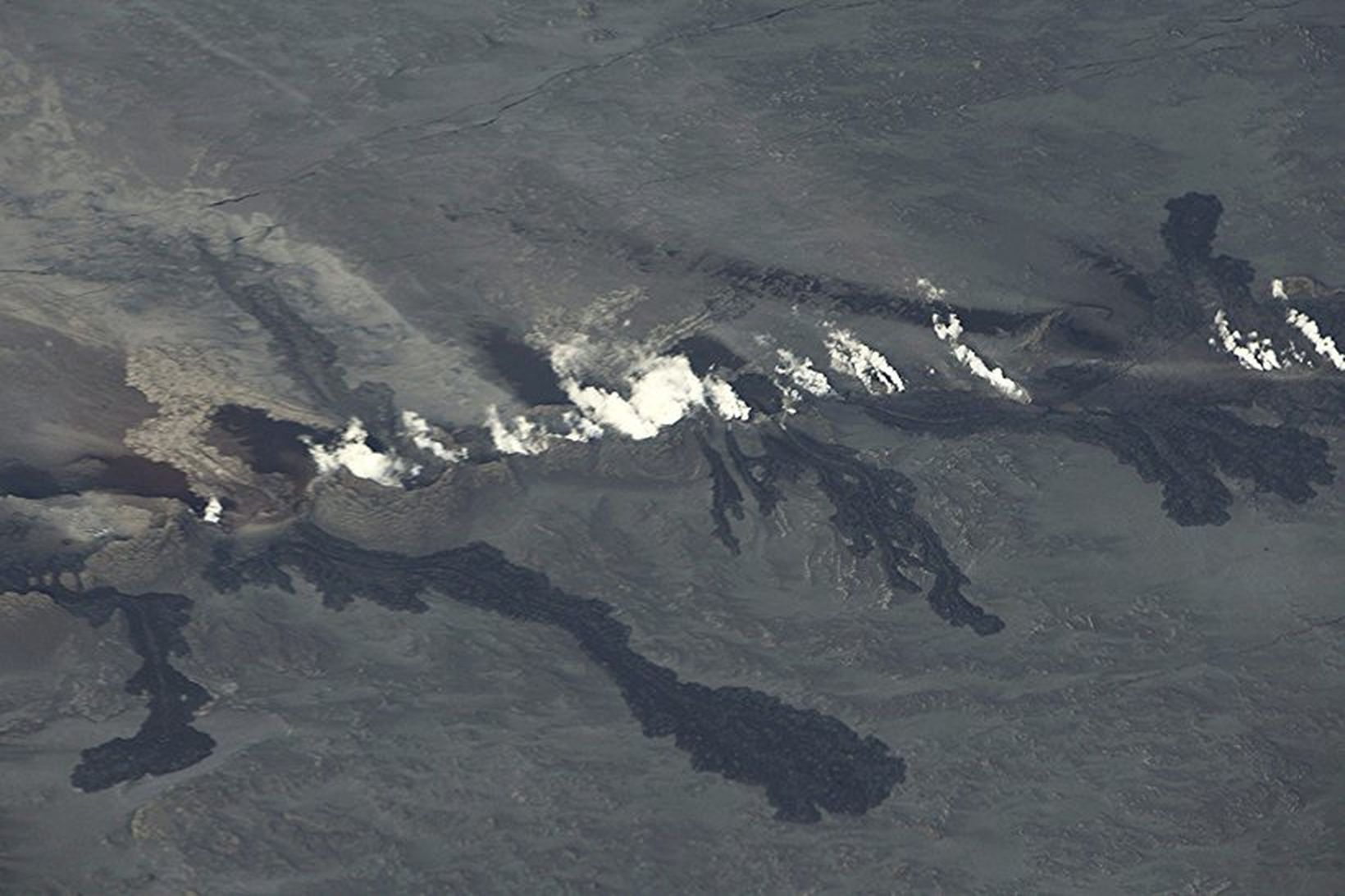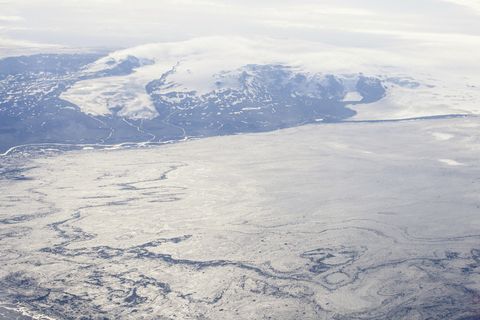Four scenarios likely around Bárðarbunga
The Holuhraun eruption site. The rift extends 1.000 meters.
Golli / Kjartan Þorbergsson
Scientists from the Icelandic Met Office, the Institute of Earth Science and representatives from the Civil Protection Department met this morning to go over the situation in the area around Bárðarbunga, Dyngjujökull and Holuhraun.
The key points of their meeting are:
- Seismicity remains high with over 700 quakes since midnight, counted at 11:45 GMT.
- The most powerful earthquakes in the area since midnight were a magnitude 4,5 quake in northern Bárðarbunga around 02:35, a magnitude 4,2 earthquake in the same area at 06:18 and 5,4 magnitude earthquake at 07:03 on the southern edge of Bárðarbunga. All times are GMT.
- Around 20 earthquakes have hit around Askja. Outflow of magma into the dyke could explain these tremors.
- Jökulsá á Fjöllum, as well as other rivers north of Vatnajökull show no signs of change in water flow.
- Scientists are examining the fresh lava from Holuhraun.
Currently, there is no way of telling what will happen. Four likely scenarios are given:
- Inflow of magma into the dyke from Bárðarbunga will stop, resulting in the event slowly fading out with no further eruptions.
- The dyke will again break through to the surface north of Dyngjujökull, possibly in a different area than last time but not under Dyngjujökull.
- The dyke might break through under Dyngjujökull, resulting in a jökulhlaup and significant ash fallout.
- An eruption in Bárðarbunga, resulting in a jökulhlaup in Jökulsá á Fjöllum, but also possibly in Skjálfandafljót, Kaldakvísl, Skaftárkatlar and Grímsvötn.
Other scenarios are also possible.
The aviation code over Bárðarbunga remains orange and yellow over Askja.
Fleira áhugavert
- Seismic activity in Iceland a concern
- A nuclear-powered submarine can be seen from the window
- "Now we'll be on the street"
- A burst of small earthquakes yesterday
- 8 months pregnant and deadlifts 135 kilos
- Seismic swarm in Askja this morning
- Blue Lagoon closed yesterday until 2 today
- No confidence vote in parliament was voted down
- Earthquake felt in the capital area with many aftershocks
- A month since the eruption began
- Seismic activity in Iceland a concern
- "Now we'll be on the street"
- A nuclear-powered submarine can be seen from the window
- A month since the eruption began
- No-confidence vote for the government in session
- A burst of small earthquakes yesterday
- 8 months pregnant and deadlifts 135 kilos
- No confidence vote in parliament was voted down
- Blue Lagoon closed yesterday until 2 today
- Live footage: Magma running down from the overflowing crater
- The magma chamber is not as deep as previously thought
- A burst of small earthquakes yesterday
- The wall of the crater has collapsed
- Seismic activity in Iceland a concern
- A month since the eruption began
- "Now we'll be on the street"
- Opened the road to Grindavík for residents and first responders
- The first real estate purchase agreements for Grindavík went through yesterday
- Earthquake felt in the capital area with many aftershocks
- The Blue Lagoon is closed today due to gas pollution
Fleira áhugavert
- Seismic activity in Iceland a concern
- A nuclear-powered submarine can be seen from the window
- "Now we'll be on the street"
- A burst of small earthquakes yesterday
- 8 months pregnant and deadlifts 135 kilos
- Seismic swarm in Askja this morning
- Blue Lagoon closed yesterday until 2 today
- No confidence vote in parliament was voted down
- Earthquake felt in the capital area with many aftershocks
- A month since the eruption began
- Seismic activity in Iceland a concern
- "Now we'll be on the street"
- A nuclear-powered submarine can be seen from the window
- A month since the eruption began
- No-confidence vote for the government in session
- A burst of small earthquakes yesterday
- 8 months pregnant and deadlifts 135 kilos
- No confidence vote in parliament was voted down
- Blue Lagoon closed yesterday until 2 today
- Live footage: Magma running down from the overflowing crater
- The magma chamber is not as deep as previously thought
- A burst of small earthquakes yesterday
- The wall of the crater has collapsed
- Seismic activity in Iceland a concern
- A month since the eruption began
- "Now we'll be on the street"
- Opened the road to Grindavík for residents and first responders
- The first real estate purchase agreements for Grindavík went through yesterday
- Earthquake felt in the capital area with many aftershocks
- The Blue Lagoon is closed today due to gas pollution



 Ofsóttur innan veggja Boeing
Ofsóttur innan veggja Boeing
 Stóraukið fé til samgöngusáttmála
Stóraukið fé til samgöngusáttmála
 Hjón sluppu með skrekkinn
Hjón sluppu með skrekkinn
 Hafa samþykkt kaup fyrir um 9,2 milljarða
Hafa samþykkt kaup fyrir um 9,2 milljarða
 Fjárfestingin 115 milljarðar króna
Fjárfestingin 115 milljarðar króna
 Markaðurinn hitnar og leiguverð hækkar hratt
Markaðurinn hitnar og leiguverð hækkar hratt
 Ekki byggt í takt við áform sveitarfélaga
Ekki byggt í takt við áform sveitarfélaga